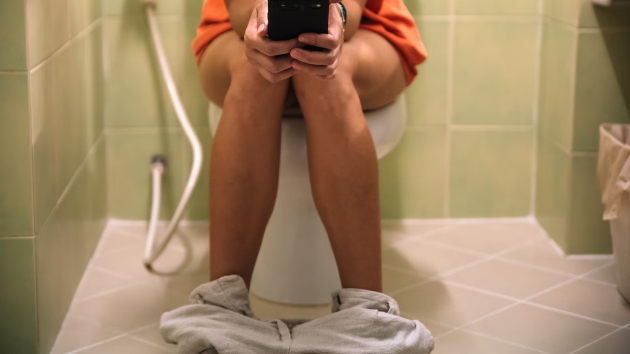
(NEW YORK) — People who use their smartphones while sitting on the toilet face are at higher risk for painful, itchy hemorrhoids, according to new research published in the journal PLOS One.
Researchers investigated the bathroom habits of 125 adults undergoing screening colonoscopies at Beth Israel Deaconess Medical Center in Boston. About two-thirds of participants reported scrolling through their smartphones while sitting on the toilet.
Those who were glued to their phone while using the bathroom were 46% more likely to have hemorrhoids compared to those who left their device in another room.
“The likely explanation is that prolonged sitting increases pressure in the veins around the rectum, which can contribute to hemorrhoids,” Dr. Ernesto Gonzaga, a gastroenterologist from the Hospital of the University of Pennsylvania and who did not contribute to the study, told ABC News.
Scrollers spent a longer time on the toilet, the researchers found — about five times as many smartphone users logged over five minutes of toilet time per visit. When researchers asked what they were doing on their phones while doing their business, people confessed to catching up on the news, cruising through their social media feeds, or sending emails and texts.
Gonzaga pointed out that phone users also reported getting less exercise than non-users, suggesting that their broader lifestyle patterns could also contribute to their risk of hemorrhoids.
Hemorrhoids are swollen blood vessels around the anus and rectum, according to the National Institutes of Health. They can cause itching, pain and discomfort, and in many cases, they can also lead to rectal bleeding. Studies show that they are common in both men and women and affect about 1 in 20 Americans and about half of adults over 50 years old have hemorrhoids.
They are mainly treated with more fiber and fluids, soothing creams or sitz baths, and in tougher cases, they may require surgery.
“In clinical practice, we still recognize the more classical risk factors for hemorrhoids, including constipation, straining, low fiber intake, prolonged toilet sitting, pregnancy, obesity, and sedentary lifestyle. Constipation and abnormal bowel habits are particularly strong risk factors, while high fiber intake is protective,” Gonzaga said.
Gonzaga noted that the study does have some limitations. It looked at a small number of subjects and relied on self-reporting, so it doesn’t necessarily prove that phone use on the toilet is a direct cause of hemorrhoids, he said. He called for more research to get to the bottom of it.
“Given that hemorrhoids already account for millions of outpatient visits and substantial healthcare costs, these findings raise a broader public health concern about a growing burden of disease, potentially extending into younger populations as smartphone use,” he added.
Noor Shaik, MD, PhD, is a neurology resident physician and a member of the ABC News Medical Unit.
Copyright © 2025, ABC Audio. All rights reserved.



